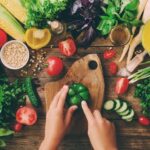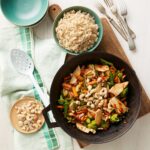
15 Healthy Food Swaps for Breakfast, Lunch and Dinner
Australians love food. Perhaps a little too much. Around two thirds of Australian adults are overweight or obese (12.5 million people) and almost one quarter of children aged 5 – 17 are overweight or obese.
Addressing this problem requires a multifaceted, whole of family approach. Families that make informed decisions can take better control of their health and wellbeing. Sustainable long-term change comes not from depriving oneself of food, but making better choices – starting with swapping out some of those nasty eating ingredients for some healthy ones.
Healthy food swaps
Every 24 hours, Australians consume on average 3kg of food. This is higher than the global average but it might not be so bad if this food was nutritionally balanced and mostly made up of vegetables and fruits.
Healthy eating is not dependent on the amount of food you consume. It is, however, dependent on the food choices you make. Swap it, don’t stop it is a good way to look at your everyday diet. Ideas for swaps at breakfast, lunch and dinner include:
Breakfast
1. Light or skim milk instead of whole milk
Milk straight from the cow is about 4% fat. Skim, although often called “fat Free”, does contain some fat, but it has to be less than 0.15% fat to be labelled as skim.
If you drink milk in your coffee, like most Australians do, swapping from full cream to skim milk could save you about 350 kilojoules per coffee. If you drink one cup of coffee per day, a straight swap could see you lose 3.5 kilograms of body fat over the course of a year.
2. Wholegrain cereal instead of high-sugar cereal
Cereals like coco puffs and fruit rings might seem like an obvious swap but a lot of Australia’s favourite cereals are highly processed and high in sugar, salt and artificial colours. To play it safe, swap out processed cereals that contain at least 50% wholegrains (porridge contains 100%) and make sure your cereal has no more than 10 grams of sugar per 100 grams.
3. Diced fruit instead of sugar sprinkle
If you like a sprinkle of sugar on your cereal in the morning, swap it out for some diced fresh or dried fruit. The average Australian has 5 – 8 teaspoons of sugar more than the recommended limit and this simple swap will help you cut back your sugar intake.
4. Low-fat greek yoghurt instead of high fat yoghurt
Whole milk yoghurt varieties contain as much as 4.4 grams of fat per 100g, compared to less than 0.15g for 100g in non-fat or fat-free yoghurts. Yoghurt products incorporating fruit may provide some additional nutritional benefit, but these can often contain added sugar. Instead of buying flavoured yoghurt, add your own fruit instead.
5. Chives instead of cheese
Cheesy scrambled egg might pack a flavour punch but so too can scrambled egg with chopped up chives. This simple swap can save you 105 calories at breakfast.
Lunch
6. Plain butter instead of margarine/spreadable butter
Margarine and spreadable butters contain vegetable oils which accumulates in the fat cells of the body as well as in the cell membranes.
7. Water instead of fruit juice
Humans have not evolved to consume any other liquid other than water. Fruit juice, even when freshly squeezed with no added sugar is a very concentrated source of sugar and can compromise immune function.
8. Wholemeal sandwich instead of a burger
A wholemeal sandwich with vegetables and protein like egg, feta or chicken contains less saturated fat, sodium and sugar and will help you feel fuller for longer.
9. Avocado instead of mayonnaise
Avocado is a terrific source of heart-healthy monounsaturated fat and is a terrific substitute for artery-clogging, high-calorie mayonnaise which clocks in at 188 calories and 20 grams of fat per 2 tablespoons.
10. Open-faced sandwich instead of regular sandwich
Sometimes that second piece of bread is unnecessary. By eating your sandwich open faced, you can cut as much as 120 calories from your lunch. If you take to it with a knife and fork you’ll also eat more slowly, allowing your body to tell you when you feel full.
Dinner
11. Extra-lean ground beef instead of regular ground beef
Full-fat ground beef contains 250 calories and 18.5 grams of fat per average serve, compared with just 116 calories and 4 grams of fat in extra-lean ground beef.
12. Plain Greek yoghurt instead of sour cream
Sour cream contains 220 calories per half-cup portion. Nonfat Greek yoghurt on the other hand, has less than half the calories and gives you an extra shot of hunger-squashing protein, allowing you to reduce your portion size.
13. Tomato and vegetable-based sauces instead of creamy or cheesy sauces
Cream-based sauces typically have twice the amount of calories and over four times more fat than tomato-based sauces. Both sauces can, however, be high in salt, so check the label.
14. Bocconcini instead of halloumi
Bocconcini contains 40% less calories than halloumi and has one fifth of the salt that halloumi has.
15. Thin crust pizza instead of thick crust pizza
If you can’t say no to pizza cravings, choosing a thin crust over a thick crust can save you 330 calories!
Want to start shopping for healthy ingredients that make healthy swapping easy? Head on down to your local Woolworths at Marketplace Gungahlin for all your needs. The Fresh Food People have an aisle dedicated to selling healthy food at affordable prices, so why not start your search there? Don’t forget to swap out your naughty snack too!

